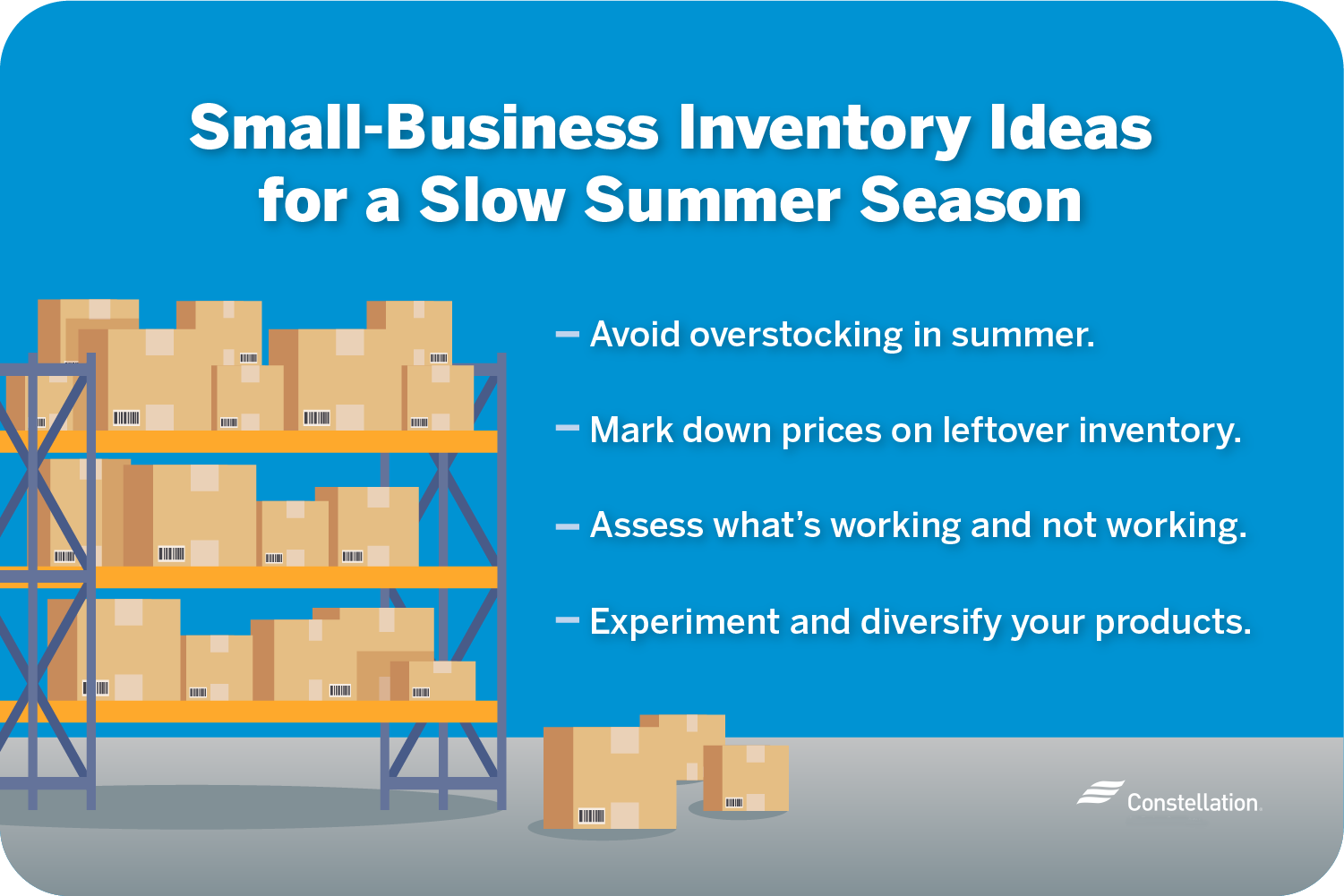
- Category:
Small Business Energy Savings -
Last updated:
November 26, 2024
Summer Expenses Your Small Business Can Cut to Save Money
If your small business is like many others, summer brings with it a unique set of challenges. It might be your busiest time of year, where you’re moving inventory as quickly as you get it or booking up services all day long. Or it could be the opposite, when income slows down to a trickle. And, of course, there are the summer energy bills from running the AC so much.
No matter what your industry, though, you’ll want to find summer expenses your small business can cut to save money. By taking a close look at your operation, you can identify waste and find ways to be more efficient, especially when it comes to energy usage.
The expenses your small business may see
Energy is likely close to the top of your summer small-business expenses. Air conditioning is considered a necessity in much of the United States during periods of extreme heat. But the AC can use a lot of electricity. Also, if summer is your busy time, you may be using more energy lighting your workplace and running equipment. And all that increased usage can add up on your summer energy bill.
If your busiest time is summer, small-business expenses may also include the additional payroll you may need to take on. Plus, you’ll have to spend more on inventory if your business sells a product rather than a service.
And if things get slow for your business in summer, simply paying your existing rent, payroll and utilities can be a challenge with a limited cash flow.
Is your small business wasting money in summer?
If you’re looking for summer cost savings, a great place to start is identifying the ways your small business wastes money. Are you wasting electricity in your workplace? Is your small business overstocking or understocking inventory? Are you overpaying for labor you don’t need?
Answering yes to any of these questions gives you a lead as to where to find summer small-business expenses to cut.
Energy bills in the summer
Air conditioning can be a difficult small-business expense to cut. Especially in some climates, you, your employees and your customers would be very uncomfortable without it.
But there are ways to find savings for your small business this summer. For instance, using an ENERGY STAR® AC unit will guarantee reduced energy usage. You can also set the temperature a little higher to save energy. The temperature you set is a matter of comfort and what you think is best for your business. OSHA recommends setting the thermostat between 68 F and 78 F, with a humidity between 20% and 60%.
Other cost-cutting strategies for your business
There are many more ways small businesses waste money in this area. Here are some additional energy-related expenses you can cut:
- Turn off unused lights and equipment. Lighting empty rooms and leaving unused equipment on is a waste that’s easy to identify and cut out. Also, unplug unused equipment to avoid the small but costly amount of energy drawn by equipment that’s powered down but still plugged in. Putting up reminder signs can help make sure these habits take hold.
- Look for air leaks. Air leaking out of your business means your HVAC has to work that much harder to regulate the temperature. Sealing them up along with added insulation and weatherstripping can improve energy efficiency. You may even want to get a full energy audit.
- Maintain your HVAC system regularly. Putting off regular maintenance can lead to costly inefficiencies and repairs. And to keep from overworking your HVAC system, keep air vents clear of obstructions, like boxes or furniture.
- Swap out your light bulbs. A significant amount of your summer energy bill will go toward lighting. Replacing incandescent bulbs with LED or CFL bulbs is one of the best workplace expenses to cut to save money.
- Program your thermostat. There’s no sense in cooling an empty workplace. Giving your AC a break during off-hours will have a noticeable impact on your summer energy bill.
- Use fans. Circulating cool air can keep from overworking your AC and will use less energy than your AC laboring alone. Just make sure to turn fans off in empty rooms. Fans cool people, not rooms.
- Install shades. The summer sun can heat up your workplace and cause your AC to work harder than it should. Window coverings and shades can help divert much of that heat from entering your small business.
- Consider a cool roof. Likewise, the summer sun beating down on your roof can also cause your AC to run overtime. One solution is a cool roof. Cool roofs reflect sunlight rather than absorbing it so less heat enters your building. Although this kind of retrofitting can be expensive upfront, it might be a worthwhile investment if you live in a hotter, sunnier region.
- Work on a laptop. Desktop computers use much more energy than laptops. If you have a choice, ditch the desktop.
- Change your business hours. Are there hours of the day that are exceptionally slow? Maybe even whole days? If so, your business hours could be wasting energy. You may want to consider closing a little earlier, a compressed workweek or some work-from-home days during the summer.
- Consider an energy management system. One way to help maximize energy efficiency is to monitor the energy use of your small business. It can reduce waste and increase the ROI of your equipment.
- Avoid running equipment during peak hours. Energy is priced higher during 9-to-5 business hours. If there’s some equipment that you can avoid running during that time and run overnight instead, you can lower your summer energy bill.
- Replace old, inefficient equipment. If you find yourself in a position to buy new equipment for your small business, make sure to upgrade on energy efficiency. ENERGY STAR® products are always a sure bet.
Inventory strategies for saving your small businesses money this summer
If you’re selling ice cream or T-shirts to beach tourists, Memorial Day to Labor Day is when you make most of your money. Likewise, warm weather is a great time for landscapers, contractors working on home renovations, many restaurants and much of the hospitality industry.
But many retailers, who do their best sales during the winter holidays, experience a summer slowdown. And with kids out of school and families taking vacations, some home services like cleaners may also have slowed business as Americans turn their attention away from home.
For businesses that sell products, even as just part of their business, inventory management plays a critical role. And regardless of whether midyear is your busy or slow time, there are plenty of summer inventory tips for small-business owners to take advantage of to save money.
How your small business can handle inventory if summer is your slow season

Consider the following inventory strategies:
- Avoid overstocking in summer. A close look at your small business’s sales history will reveal seasonal trends: when you’re busy and when you’re not. Retailers can save money by limiting reorders in advance of the summer. Restaurants that experience slowed traffic can move to a limited menu of their most popular dishes.
- Mark down prices on leftover inventory. Excess inventory costs your business money, not only in the initial purchase but also in storage costs. Unsold products sitting on shelves mean less cash flow for your small business. And if your inventory is perishable, like food, you could lose that money altogether if you don’t sell it in time. One summer inventory strategy to consider is a reasonable markdown on slow-selling products to release some cash flow.
- Assess what’s working and not working. A slowdown is when small-business owners can take the time to really think about how to improve. By looking back at the successes and mistakes of the previous year, you can make the adjustments you need to become a more successful business, saving money now and into the future. And by doing some sales tracking and demand forecasting, you’ll be ready to hit the ground running when business picks up again.
- Experiment and diversify. A slowdown is also a good time to try something new. If you own a restaurant, maybe you have a new recipe you’d like to try out that could be a hit. Or you could sell ice cream in front of your establishment. Retailers may want to try selling some seasonal products they might not normally carry other times of the year. For instance, if you specialize in Christmas gifts, you could sell beach/pool products during the summer months. And get creative with promotions. For instance, if you sell kitchenware, try hosting summer cooking workshops in your store. You’ll engage your customers in the off-season and possibly generate some sales you might not have normally gotten.
How your small business can handle inventory if summer is your busy season
Consider the following inventory strategies:
- Track inventory closely. Your inventory is your profit, so controlling it is key to making the most of your company’s busiest time. If you don’t have a point-of-sale (POS) system now, you may want to invest in one to make tracking easy and seamless.
- Restock popular products quickly. Running out of a popular item costs your small business money and runs the risk of angering customers. Make sure to keep on top of your inventory and reorder right away in busy times. A POS system could do that for you automatically, reordering after an inventory item goes under a predetermined level. And don’t forget to take into account how long it will take your supplier to restock you. Shipping times may vary.
- Notify suppliers of your increased needs. If you know you’ll be busy, make sure your supplier knows well in advance of your increased needs and can accommodate you. Supply problems can cost you in lost profits.
- Embrace online sales. E-commerce sales as a percentage of total retail sales has consistently gone up over the past decade. Finding out what online customers are looking for — and how you can stock to accommodate them — is one of the best summer inventory tips for small-business owners.
- Consider an inventory loan. If you don’t have adequate cash flow to properly stock your inventory for your busiest time, you may want to look into an inventory loan. The idea is that the money you borrow would pay for some of your inventory, which you would then sell at a profit and use some of that money to pay back the loan. The inventory you purchase would be used as collateral, but your lender may also require a lien on your business assets and/or a personal guarantee. Inventory loans are meant to be paid back in a short amount of time, not over years, and it may not be right for your small business. You should closely examine whether the costs and risks associated with the loan are worth it before making a decision.
Ways your small business can save money on payroll in summer
Labor costs can be a challenge for small businesses during a slowdown. But there are some payroll expenses to cut to save money in summer:
- Hire summer interns. Most students in the U.S. have the summers off and may be looking for work experience. Internships can be paid or unpaid, and there are government guidelines you’ll have to follow. If properly done, you can add a lot of value to your small business with a summer intern, at little cost.
- Source contractors. Some job positions only exist in the summertime. In those cases, you may want to hire an independent contractor. These kinds of employees file a 1099-MISC tax form rather than a W-2 form. That means you won’t be responsible for taking out taxes or paying for benefits, which can save you a lot of money over the time of the contract.
- Hire employees part time. You aren’t required under law to provide benefits to employees who work less than 30 hours a week, which can save your small business money.
- Work with family members. You can save some money by hiring family members, especially if your child is old enough to work. For instance, if you own a small family business and hire your kid who’s under the age of 18, you can avoid paying their Social Security and Medicare taxes as well as unemployment (FUTA) taxes. There are still rules you’ll have to follow, though, so make sure you obey labor laws.
Other small-business costs you may want to cut
As mentioned above, you should look for waste when trying to figure out workplace expenses to cut to save money. Many of the following ideas are things you can do in your small business any time of year, not just summer.
- Cut paper waste. Do you need to print out that email? How about that report? If you just need a hardcopy, but no customer will see it, print it out on the back side of old documents. Or set your printer to print front and back. There are plenty of ways for your small business to save money by limiting paper use or even going paperless.
- Cancel unused subscriptions or services. For instance, your small business may require certain software to operate, but does every employee need a subscription? Think hard about what you really need and start cutting what you don’t.
- Exchange services with another small business. One way to save money is by not using it at all. There are probably other small businesses in your area that are also experiencing a slowdown. A local CPA could trade tax preparation for work on their website. Dental work could be exchanged for some landscaping. You should know, however, that the IRS has rules about reporting bartering income.
Summer small-business expenses can be daunting, but you have many opportunities to lower them and raise profitability. You can adjust inventory, try different employment arrangements and follow a few tips to avoid energy-wasting mistakes and lower your electricity bill. But whether summer is a downtime for your business or the period when you make most of your money, knowing where to cut unneeded expenses can surely help you better succeed.




